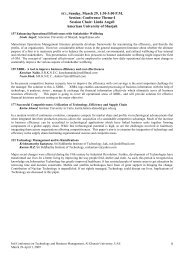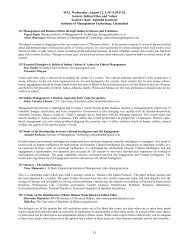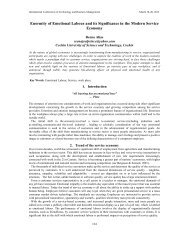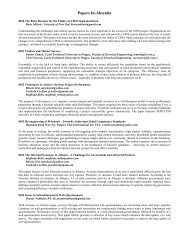Contributed Papers - Icmis.net
Contributed Papers - Icmis.net
Contributed Papers - Icmis.net
You also want an ePaper? Increase the reach of your titles
YUMPU automatically turns print PDFs into web optimized ePapers that Google loves.
2A-8, Sunday, January 2, 9:20-10:40 A.M.<br />
Session: Management Education in 2020-III<br />
Session Chair: Deepak Danak<br />
Nirma University<br />
8356 Addressing Challenges of Management Education in 2020: The Four ‘S’ Framework<br />
Deepak Danak, Nirma University, danak@imnu.ac.in<br />
We present “Four ‘S’ Framework” that can be used by any management institute for designing its unique response strategy for<br />
identifying and occupying its desired position in the market for management education in future. The four S’s stand for (i) going<br />
for competitive positioning based on market SEGMENTATION, (ii) developing curricula to address the issue of<br />
STAKEHOLDER VALUE CREATION, (iii) focusing on developing the SPIRITUAL QUOTIENT in the students, and (iv)<br />
building the pedagogy around the core of SIMULATION EXERCISES. The framework is a result of analyzing past and present<br />
trends in management education, and extending them to the future.<br />
8358 The Role of Management Education in 2020: Indian Context<br />
Ashwini Purandare, Symbiosis Institute of Management Studies, ashwinip@sims.edu<br />
Management Education going global not only brings challenges to appreciate how the world does business but also develop and<br />
sensitize the local populace towards it. Transparent communication systems, governance, uniform reporting standards and laws,<br />
dealing with transnational resources, economies, societies and politics would be an inevitable part of learning in the new<br />
management education order. It would also throw challenges to develop and sustain world class universities by countries. The<br />
paper attempts to identify issues, challenges and opportunities for Indian business education for industries which are the thrust<br />
areas in the Indian Planning Commission report on India Vision 2020.<br />
8372 Management Education in 2020<br />
Mohammad Murtuja, ICFAI University Jharkhand, Ranchi, murtuja_786@yahoo.co.in<br />
Vision building is a challenging exercise as it aims to construct future scenarios and link it with the present. Rapidly management<br />
courses are being changed due to corporate requirements. In the coming future areas of focus will be Environmental Management,<br />
Event Management, Hospitality and Tourism Management, Telecom Management etc.My paper will focus on environmental<br />
issues related topics like Corporate Social Responsibility, Social Responsible Investment and Carbon Trading which will be of<br />
great concern in 2020, will be a part of specialized management courses. It will also focus on innovative teaching methods;<br />
courses with exit point any time, academic flexibility.<br />
8410 Management Education 2020 – The Issues and Challenges<br />
Shiney Chib, Datta Meghe Institute of Management Studies, shinychib@gmail.com<br />
The business sector in India is highly promising in the present scenario. The impact of globalization has changed the business<br />
procedure in India in terms of psychology, methodology, technology, mindset work culture etc. With the dawn of new<br />
millennium, while there was phenomenal growth in the number of B-Schools, the benchmarks were also on the rise. Of the 1500<br />
B- Schools India currently has, there might be around 200-250 schools, which might stand a standard test of quality.Management<br />
courses have become Academic Courses rather than Professional one. Management Institutes, barring a few exceptions, have<br />
reduced to commerce colleges.<br />
9013 A Utopian framework for teaching Performance Management at B-Schools<br />
Noel Machado, Tata Institute of Social Sciences, noel.machado@gmail.com<br />
Over the last 50 years, neo-liberalism has gained dominance as an economic ideology. Management education has been accused<br />
of lacking intellectual pluralism, not providing alternative ontologies of business performance, and even of being ‘complicit’ in<br />
the erosion of corporate values. What we teach management students about performance management will influence how<br />
businesses are run in the future. Academicians have debated implications of using theories, cases and praxis in education. This<br />
paper reviews above context and presents pedagogical innovations in the performance-management course taught to HR students<br />
(Class of 2010) at the Tata Institute of Social Sciences.







